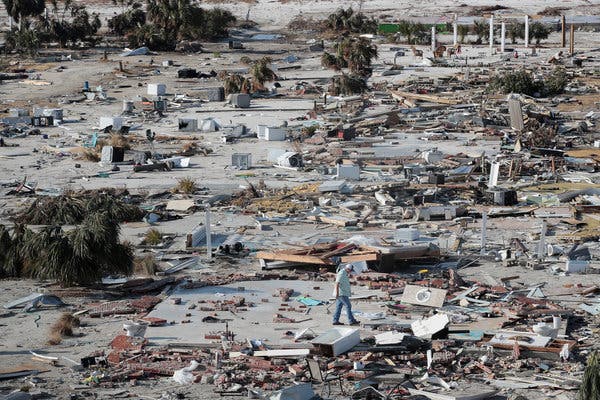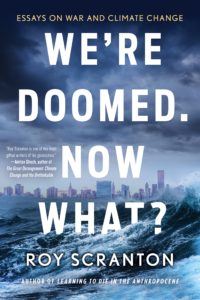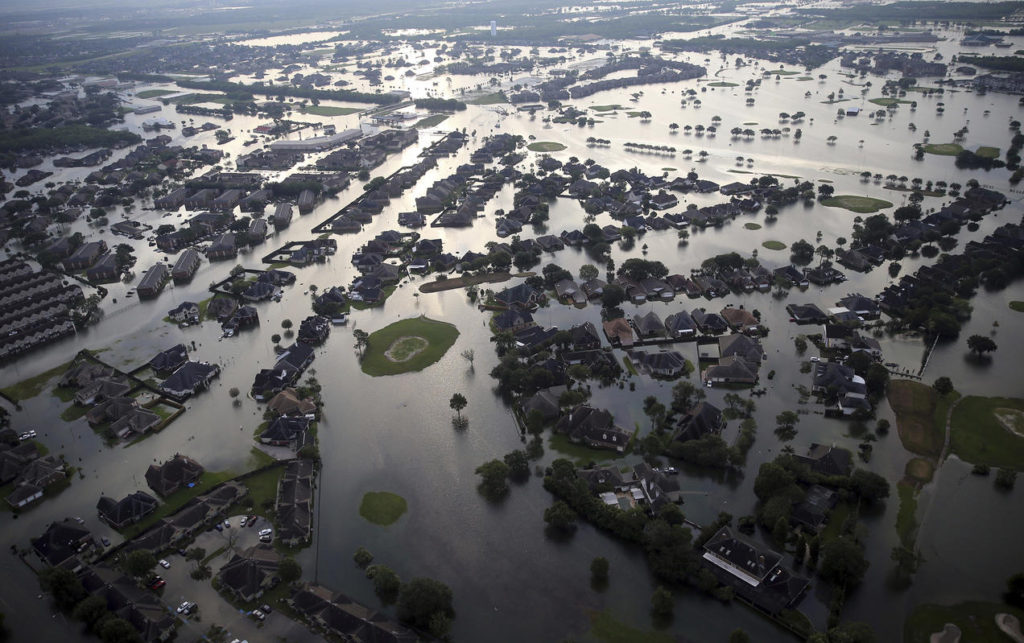The Apocalypticists Are Disappointing
How do we face the climate crisis and ourselves?

Recently, a friend of mine—a pragmatic woman, fiercely intelligent and well-respected in her field—was at an academic cocktail party and made a pessimistic comment about the likelihood of stopping climate change. Someone to her right frowned in dismay and gestured at a pregnant woman in their circle. “How can you say that?! And with new life right here.”
My friend was startled but no one else remarked on the strangeness of a knee-jerk appeal to the “angel of the house” at a leftist academic gathering in the Year of Our Lord 2019. Instead, little by little, the conversational tide resumed, washing away the momentary unpleasantness of her observation.
It is not, in the end, so surprising that someone who didn’t want to entertain troublesome thoughts might duck and weave behind the sanctity of motherhood. It’s a sturdy enough shield, if a little time battered, and we seem to be in a mood to think of our catastrophes in freighted symbolic terms. Greta Thunberg has emerged like some child-prophetess spun out of Homeric hexameter to warn the decaying empire of its doom. The best novel of the past few years, Richard Powers’ The Overstory, is a half-parable where the action is stretched to the unnerving, inhuman timeframe of a tree. Meanwhile, the most successful climate-change book of recent memory, David Wallace-Well’s The Uninhabitable Earth, is a litany of world-destroying disasters that began as a viral article in New York Magazine.
 After thirty years or so of throat clearing, we have all begun to settle in for a good jeremiad. At first tentatively, but now with increasing conviction, our op-eds have begun to thunder warnings about our watery doom and the coming years when the earth will reject our seeds. The apocalypse has ceased being an object of entertainment in movies about asteroids, pandemics, volcanoes, floods, hurricanes, aliens, and zombies and become a topic of elevator chitchat. (Or perhaps merely my elevator’s chitchat.) At times, the only real question left seems when one of these clean-cut thirty-something men who love to tell me that it’s worse than I imagine will muster up enough imagination to tap into the apocalyptic roots of our very Christian nation and begin a commune or a telethon—whatever strikes them first.
After thirty years or so of throat clearing, we have all begun to settle in for a good jeremiad. At first tentatively, but now with increasing conviction, our op-eds have begun to thunder warnings about our watery doom and the coming years when the earth will reject our seeds. The apocalypse has ceased being an object of entertainment in movies about asteroids, pandemics, volcanoes, floods, hurricanes, aliens, and zombies and become a topic of elevator chitchat. (Or perhaps merely my elevator’s chitchat.) At times, the only real question left seems when one of these clean-cut thirty-something men who love to tell me that it’s worse than I imagine will muster up enough imagination to tap into the apocalyptic roots of our very Christian nation and begin a commune or a telethon—whatever strikes them first.
I am being flippant but not entirely. It really wouldn’t be surprising if Paul’s cry to give up our lives, our goods, our earthly attachments in expectation of the apocalypse were taken up again. In fact, it seems so very natural to me that we might fall back on two thousand years of dreaming about the lives we will slough off when the new age arrives, that I sometimes feel bewildered that everyone takes it so calmly when our secular prophets denounce the efforts to change our tiny, insignificant lives—when they preach that nothing we, as individuals, can do will matter. And not just that nothing we do, short of a revolution, will matter but that all of the efforts to compost, to thrift, to limit driving are ridiculous, pompous, and wrong.
It’s a puzzle and one that needs the body of that poor woman at the cocktail party to fill in.
But first, a case study.
***
Roy Scranton doesn’t look like much of a wild-eyed prophet in any photos I have seen of him. Mild-eyed, blond, and thoughtful with neat wire-rimmed glasses, he looks very much like what he is now (an academic), a little like what he was growing up (a boy from rural Oregon), and not at all like what he was in the years that made him a writer (a soldier).
But it was his authority as a soldier that gave Scranton an entry into the literary world, first as a novelist and then, more securely, as a commentator on climate change. His previous book, Learning to Die in the Anthropocene, began as a New York Times editorial, artfully weaving together his conviction that Western civilization is doomed with his time in Iraq, learning to accept his mortality. We’re Doomed, Now What? is his follow-up book, nominally meant to answer the title question.
 There’s much to admire in the book. Scranton’s chief virtue might be that he’s not worried about making himself sound likable. He frankly admits that he is a bad environmentalist, one who drives cars and eats meat. He challenges the “‘can do’ Yankee grit,” which leads so many to reject the idea that something is outside of our control as blasphemy. He points out with unpitying logic that historical precedent guarantees nothing about the future. Most importantly, he said back in 2013—years before the IPCC report with its famous “thirteen years” number began finally, finally injecting some urgency into the conversation around climate change—that, “The biggest problem we face is a philosophical one: understanding that this civilization is already dead.” In his new book, he puts the problem even more bluntly:
There’s much to admire in the book. Scranton’s chief virtue might be that he’s not worried about making himself sound likable. He frankly admits that he is a bad environmentalist, one who drives cars and eats meat. He challenges the “‘can do’ Yankee grit,” which leads so many to reject the idea that something is outside of our control as blasphemy. He points out with unpitying logic that historical precedent guarantees nothing about the future. Most importantly, he said back in 2013—years before the IPCC report with its famous “thirteen years” number began finally, finally injecting some urgency into the conversation around climate change—that, “The biggest problem we face is a philosophical one: understanding that this civilization is already dead.” In his new book, he puts the problem even more bluntly:
“There is little reason to presume that we’ll be able to slow down global warming before we pass a tipping point. We’ve already exceeded 1.5 Celsius above pre-industrial temperatures and there’s more warming baked in. The West Antarctic ice sheet is collapsing, Greenland is melting, permafrost across the world is liquifying, and methane has been detected leaking from sea floors and Siberian craters: it’s probably already too late to stop these feedbacks, which means it’s probably already too late to stop apocalyptic planetary warming.”
The first sense that something is off came as I tried to fit this bleak summary in with the title of his book and realized I didn’t actually know what Scranton considers doomed. The human species? All of the species? The nation state? Late stage capitalism? What does the death of a civilization mean? The end of Amazon same-day deliveries or the end of electricity and antibiotics? Is it just that we won’t have McMansions or that we’ll be living in underground bunkers wearing animal pelts? Or is it that we, or maybe our grandchildren, will quite simply die?

Tropical Storm Harvey (AP Photo/Gerald Herbert)
Still, these confusions, taken by themselves, wouldn’t be much of a problem. Even if he is unclear, possibly even in his own thoughts, about what is doomed, he knows who and what doomed us. Capitalism? Of course, but also the whole rancid culture of technocratic elitists who only see value in action insofar as it produces a measurable result. More than anything, he wants the end of the hubristic belief that we can think or plan or spend our ways to salvation. He is one of those classic critics of modernity I read in college, a new Heidegger railing against the reduction of the world to resources for us to use, his untimely meditations made timely by our careening rush toward destruction. As such, what he ultimately wants us to do is stop. He even says as much in his penultimate essay, “What is Thinking Good For?” “The thinker, that is to say, is an interrupter: not merely a node or amplifier within social circuits, but a place of stillness. An active pause. A total ecstatic absorption in the now.” For my part, I hear echoes of Pablo Neruda:
“If we were not so single-minded
about keeping our lives moving,
and for once could do nothing,
perhaps a huge silence
might interrupt this sadness
of never understanding ourselves
and of threatening ourselves with death.”
If he had written this book a year or two later, his great target might have been the businesses currently scouring the planet looking to make money by building private firefighting companies in California, planting trees in Nigeria, or speculating in Sudanese land in advance of a civil war. Instead, his attention became occupied with something else altogether. He became a father.
He knows this decision requires, at minimum, explanation.
He doesn’t exactly have an explanation—or maybe he does, which is that he once was a good pessimist and then the meaty, mammalian part of his brain took over and flooded him with a desire for a tiny pink child with fingernails like seashells who he could love and mourn and comfort when she cried. But the terrible humanity of that fact is swaddled in one of the more pernicious arguments circulating today—the idea that changing individual behavior is not only pointless but naive.
Scranton is too smart to put the argument in exactly those terms. His actual claim is more nuanced. He begins by summarizing a 2017 letter by Seth Wynes, a geographer, and Kimberly Nicholas, an activist, arguing that the most effective things any one of us can do to shrink our carbon footprint is to go vegan, stop flying, give up cars, and have one fewer children. “The real problem with this proposal,” Scranton notes, isn’t with the idea of teaching abstention and thrift, which is all well and good, but rather with the social model their recommendations rely on. Contra Adam Smith and Margaret Thatcher, society is not simply an aggregate of millions or billions of individual choices, but a complex recursive dynamic in which choices are made within institutions and ideologies which then subtly change over time as these choices feed back into the structures that frame what we consider possible, all the while being disrupted and nudged and warped by countless internal and external drivers, including environment factors such as global warming, material and social innovation, and the occasional widespread panic. Which is just to say we are not free to decide how to live any more than we are free to break the laws of physics. We choose from options, not ex nihilo.
He then immediately starts ticking off all the reasons why Wynes and Nicholas demand the impossible.  Veganism is “a sacrifice I’m reluctant to make, despite the moral and economic costs of factory farming, because I know, through my years as a vegetarian, that totally foregoing meat leaves me depressed and lethargic.” Giving up flying and driving would be fine, if he hadn’t moved to a city built for cars with a completely inadequate public transit system, which happened to be a thousand miles away from family. “No car? No job. No flying? No Thanksgiving with the family.” “As for not having a child, of course nobody needs to have children. It just happens to be the strongest drive humans have.” No, he concludes, “To take Wynes and Nicholas’s recommendations to heart would mean…choosing a hermetic, isolated existence and giving up any deep connection to the future.”
Veganism is “a sacrifice I’m reluctant to make, despite the moral and economic costs of factory farming, because I know, through my years as a vegetarian, that totally foregoing meat leaves me depressed and lethargic.” Giving up flying and driving would be fine, if he hadn’t moved to a city built for cars with a completely inadequate public transit system, which happened to be a thousand miles away from family. “No car? No job. No flying? No Thanksgiving with the family.” “As for not having a child, of course nobody needs to have children. It just happens to be the strongest drive humans have.” No, he concludes, “To take Wynes and Nicholas’s recommendations to heart would mean…choosing a hermetic, isolated existence and giving up any deep connection to the future.”
Some of this argument is simply correct. Yes, this is a problem that is much bigger than my individual choice to give up flying. Some of it is sympathetic enough—we have abysmal infrastructure in most areas of the country and giving up a car truly wouldn’t be possible for most people. Some of it relies on unkind misreadings. Even in Scranton’s own account, Wynes and Nicholas don’t insist that people should give up having children altogether, merely that they should have one fewer. Some of it just sounds like whining. (Granted these ideals might not be completely realizable by Scranton or many others, why not try to do better? Why not carpool or have fewer but longer visits home during a time of years when it might be possible to travel by train rather than plane? We’re not all called to be monks, but that doesn’t mean the only other choice is to be Henry VIII.)
Even on Scranton’s own terms, it is strange to be so hostile to Wynes and Nicholas. We may not be able to choose how to live ex nihilo, but by making a compelling moral and pragmatic case for living more sustainably, aren’t people like Wynes and Nicholas expanding the range of possible lifestyles? Would it be better if they remained silent and ceded all input into our “complex recursive dynamic” to Amazon and Exxon? Are the choices they recommend really unprecedented within our current society? 375 million people globally are already vegetarian, according to a quick Google search, and by only having one child Scranton is already fulfilling the call to have fewer children. Those don’t seem like particularly novel ways to live. Mostly, though, the argument falls apart because the main point—there are countless realities that shape the possibility and impact of individual choices—in no way entails the conclusion—therefore what Wynes and Nicholas ask is an impossible demand to reimagine life from scratch.
But that is not Scranton’s only argument against the demand to change his life. His more visceral objection is against anyone who might imagine that buying eco-friendly products or thrifting or composting or carpooling could ever be enough to absolve herself of guilt. He dislikes “Yankee can-do grit” but he hates anyone who claims moral purity. Based on Wynes and Nicholas’s argument, he concludes, “The only truly moral response to global climate change is to commit suicide. There is simply no more effective way to shrink your carbon footprint.”
Almost entre parenthèses, I have to note that this argument is simply mathematically wrong. Imagine you are an average American, producing 20 metric tons of CO2 per year. Now, imagine you successfully shrink your annual carbon footprint in half by some combination of living in an apartment instead of a single-family home, carpooling, limiting or eliminating flights, installing solar panels, buying used when possible, reducing your consumption, reducing food waste, eating less meat—all of the decisions Scranton derides, in short. You then get a half dozen of your closest friends to shave two tons off of their own carbon output each, perhaps by carpooling with them, or by encouraging them to thrift, or by swapping vegetarian recipes. Is your net carbon footprint positive or negative? Well, there are now twelve fewer metric tons of carbon being spewed into the air each year because of your influence. You only produce ten tons. The carbon output attributable to you is now negative. The moral response, mathematically, is not to kill yourself; it’s to influence others to live more sustainably.
 But here is the bigger problem with this claim: No one is talking about moral purity except for him. Somehow, bewilderingly, we have moved from an argument about the efficacy of individual change, to an argument about the moral purity of the people recommending individual change. It is easy enough to imagine why Roy Scranton, the person, makes this leap. Perhaps he is defensive about having a daughter, given his very public insistence that we’re doomed, and wants to fend off the accusations that he’s a hypocrite by taking aim at the idea that anyone is morally pure when it comes to climate change. Whatever the reason, he ends his attack on the whole notion of moral purity with a moment of tremendous contempt, as he writes, “While you could, if you had the will for it, go off the grid, your subsistence farm would still be a tiny holocaust for the pests who would seek to live off of your bounty, your land deed would still need to be recognized by the state, and you would almost certainly need to enslave animals, if not for food and material such as milk, leather and bone, then at least for labor.”
But here is the bigger problem with this claim: No one is talking about moral purity except for him. Somehow, bewilderingly, we have moved from an argument about the efficacy of individual change, to an argument about the moral purity of the people recommending individual change. It is easy enough to imagine why Roy Scranton, the person, makes this leap. Perhaps he is defensive about having a daughter, given his very public insistence that we’re doomed, and wants to fend off the accusations that he’s a hypocrite by taking aim at the idea that anyone is morally pure when it comes to climate change. Whatever the reason, he ends his attack on the whole notion of moral purity with a moment of tremendous contempt, as he writes, “While you could, if you had the will for it, go off the grid, your subsistence farm would still be a tiny holocaust for the pests who would seek to live off of your bounty, your land deed would still need to be recognized by the state, and you would almost certainly need to enslave animals, if not for food and material such as milk, leather and bone, then at least for labor.”
What to make of this startlingly ungenerous riposte? Why does Scranton not just disagree with these people but despise them? Telling imaginary interlocutors to go kill themselves if they’re so worried about their moral purity is a child’s response or a troll’s, not a serious thinker’s. Taunting activists with the specter of murdered insects is hardly much better. Somehow, a type of bullying machismo has taken over the essay. Scranton the thinker of sad truths has become Scranton the Stoic, who passionately hates the whole world of environmentalists who advocate thrifting, composting, and reducing consumption. The soldier hates those who play out their politics in the domestic sphere.
And those targets? They are overwhelmingly women.
Scranton doesn’t say as much; his ostensible foils are Wyne and Nicholas. But to anyone remotely conversant with environmentalism in America, the most visible advocates of changing our consumption patterns are the largely twenty- and thirty-something white women of the zero waste movement. (Mind you, I say most visible, not only.) They run blogs called things like “Trash is for Tossers,” “Litterless,” and “Going Zero Waste.” For those interested in fashion, there are My Green Closet and Project 333 advocating capsule wardrobes, and a host of bloggers following Livia Firth’s challenge to buy only clothing that will get 30 wears. There are women writing cookbooks to reduce food waste, like Lindsay Jean-Hard, who runs a column in Food 52 called “Cooking with Scraps” and a seemingly endless number of young women on Reddit’s ZeroWaste swapping tips about how to sew reusable menstrual pads.
And, yes, sometimes they are thin, wealthy white women with luminous skin, shilling impossibly expensive linen dresses, and flaunting photos of how all their trash for a year fits in a mason jar, but just as often they are debating corporate tactics of “greenwashing” products to make them seem more sustainable, lamenting the impossibility of real change within a capitalist system that produces much of its waste upstream of the consumer, and acknowledging the degree of economic privilege necessary to go zero waste.

Greta Thunberg
Since we tend not to imagine young women as political agents, especially young women on Instagram, nothing is easier than to dismiss their collective body of work as “lifestyle blogs” and treat their point that consumption choices matter as frivolous or ill-conceived. But an argument is not wrong simply because it is espoused by young women on Instagram, any more than the arguments in favor of gun control have no validity because their most prominent activists are the Parkland teenagers, or climate change can be safely ignored because Greta Thunberg is young, autistic, and Scandinavian. It is bad faith to assume every person recommending that we fly less or drive less or buy used or, for Heaven’s sake, ratchet down our insane overconsumption at least a little, is some knock-kneed idiot from Park Slope clutching her Swedish dishcloth as if that were enough to mop up Miami. It might be expedient to pretend that is the case but it is not honest.
None of this means that Roy Scranton is personally a misogynist. He might be a perfectly lovely person, completely oblivious to the gender implications of dismissing people who advocate lifestyle change as fantasists who go faint at the idea of killing insects on their off-grid farms. Whatever he means to say, though, he is voicing an argument that is powered by misogynistic stereotypes.
I can hear the objections. “The reason we feel so much disdain for these people is that they keep pushing the idea that individual choices will be sufficient to solve the crisis, when really it will take systemic change—quite possibly even revolution and the overthrow of capitalism as we know it.” But there is no reason a commitment to individual change can’t co-exist with the belief that the only thing that will really save us is mass, governmental, revolutionary change.
Scranton’s insistence that individual action is pointless rests on a fairly common misunderstanding about the relationship between individual action and systemic problems. I would hazard that most academics reading this piece more or less agree that racism is a systemic problem, with deep roots in violent histories, slavery, unjust laws, decades of redlining, school segregation, and ingrained habits, among others. I would also hazard that most would agree that white individuals simply being nice to black individuals won’t fix the problem. Yet no one would think for a nano-second that white people now have license to sling around the “n” word because their individual actions don’t matter. Why? Because we intuitively understand that the presence of enormous forces, shaping us and existing far outside of our control, doesn’t actually absolve us of the responsibility to behave ethically in the here-and-now. Your actions in everyday life are an expression of your values and if you don’t hold fast to your values when they are inconvenient or your virtue is unrewarded then you don’t hold them at all.
The only way it makes sense to disregard individual action is if climate change is an entirely pragmatic matter that really can only be solved on a national and international level. If buying and trashing a new wardrobe from Zara every season is fine except for the small detail that it is unsustainable, if melting ice sheets in Greenland only bother us because they one day will make Miami uninhabitable, if the mass extinction of other species only matters because it might one day affect our crops, if, in short, the planet has no value except insofar as it sustains human life, then we can gaily chuck our litter straight into the Grand Canyon and—why not?!—bulldoze all of Brazil to raise a few more cows for our hamburgers. So long as we can still hole up in our air conditioned apartments and save ourselves the worst inconveniences of the heat, why worry?
 The thing is that Scranton does care, by his own admission. He ends the book for a call to “live ethically in a broken world,” and with a startlingly earnest paean to nature. So if, like Scranton, we claim to “believe in the first pink cherry blossoms bursting and falling in the spring…squirrels chasing each other through maple branches, toads mating by the river, herons nesting in the bogs, and knobby-kneed fawns bounding through open meadows,” for non-instrumental reasons, we ought to do the little things as an expression of that care. I think of it this way. One day my husband asked me please not to leave the sponge in the sink but to put it on the counter where it could dry out. Now, does it really matter where the sponge goes? Is the location of the sponge even within the top 100 things that bother my husband? Will putting the sponge away materially alter his life or destroy our relationship? Will it shield him from job stress or prevent him from being hit by a bus tomorrow or dying at one hundred in his sleep? Of course not. We’re all maggot food on a rapidly heating planet orbiting a star that will engulf our planet in another five billion years, give or take. Nothing we do matters, from the long view, least of all what I do with the stupid sponge. But what did I do? I started putting the sponge on the counter. Not because I thought this one single action made the slightest bit of difference to anything, even our marriage (which has survived just fine the few times I have forgotten) but because I love my husband and didn’t want to keep doing something that made his life worse, no matter how trivial. That is the point Scranton misses when he pooh-poohs the efficacy of driving less, of flying less, of giving up steak. It’s not about saving the world through consumption choices alone. It’s about living as if he actually gave a damn about the planet he built a career on eulogizing. It’s about enacting his self-professed regard for the cherry blossoms, even if the planet explodes tomorrow.
The thing is that Scranton does care, by his own admission. He ends the book for a call to “live ethically in a broken world,” and with a startlingly earnest paean to nature. So if, like Scranton, we claim to “believe in the first pink cherry blossoms bursting and falling in the spring…squirrels chasing each other through maple branches, toads mating by the river, herons nesting in the bogs, and knobby-kneed fawns bounding through open meadows,” for non-instrumental reasons, we ought to do the little things as an expression of that care. I think of it this way. One day my husband asked me please not to leave the sponge in the sink but to put it on the counter where it could dry out. Now, does it really matter where the sponge goes? Is the location of the sponge even within the top 100 things that bother my husband? Will putting the sponge away materially alter his life or destroy our relationship? Will it shield him from job stress or prevent him from being hit by a bus tomorrow or dying at one hundred in his sleep? Of course not. We’re all maggot food on a rapidly heating planet orbiting a star that will engulf our planet in another five billion years, give or take. Nothing we do matters, from the long view, least of all what I do with the stupid sponge. But what did I do? I started putting the sponge on the counter. Not because I thought this one single action made the slightest bit of difference to anything, even our marriage (which has survived just fine the few times I have forgotten) but because I love my husband and didn’t want to keep doing something that made his life worse, no matter how trivial. That is the point Scranton misses when he pooh-poohs the efficacy of driving less, of flying less, of giving up steak. It’s not about saving the world through consumption choices alone. It’s about living as if he actually gave a damn about the planet he built a career on eulogizing. It’s about enacting his self-professed regard for the cherry blossoms, even if the planet explodes tomorrow.
***
If I have focused on Scranton, it is because I think he gets something right amid everything else he gets wrong. Our infinite American faith in our ability to solve anything is starting to crumble and we really do need to imagine how to live in a world where there are monstrous injustices of our own making that we have no power to fix. That is where I think his courage lies. Not in telling us that we’re doomed—every two-bit director with zombie prosthetics has been telling us that for the last two decades—but in telling us that we have created some problems that are too big and tangled and tragic to ever make whole. And then, again, in telling us that we need to learn how to live with those failings with humility, rather than making them worse.
I disagree with Scranton about what that way of living with the unfixable looks like. I think he creates adversaries where he ought to see allies and in doing so finds himself complicit in a dark turn in American politics, where sustainability has become coded as women’s work and Stoic resignation as a man’s response. But even in his prickliness, he asks the right questions. How can we live as pessimists but not nihilists? How do we face the possibility of the worst without taking refuge in the idea that nothing matters? How do we keep that reflexive sense of the man at that cocktail party that life is precious, without using the sanctity of that life to deflect questions we had rather not entertain? How do we live every day with the knowledge we have done the unforgivable?
This question matters—and I will stop here because I feel myself slipping perilously close to prophecy, which hardly sits better on a thirty-something white lady than a thirty-something man—because the planet isn’t the only thing we’ve broken so badly it is hard to imagine a repair. What can make politics feel so tragic and hopeless is that most of our social ills feel impossible to set right. It’s not just about believing in the first pink cherry blossoms, which after all will fade and fall silently no matter what we do; it’s about believing in people who are rightfully furious about the whole, long brutal course of history and may never, never forgive a single moment of it.
Liane Carlson is the former Henry R. Luce Postdoctoral Fellow at NYU’s Center for Religion and Media. She lives in NYC, where she is writing a book tentatively titled Against Forgiveness. Her first book, Contingency and the Limits of History: How Touch Shapes Meaning and Experience, is available from Columbia University Press.